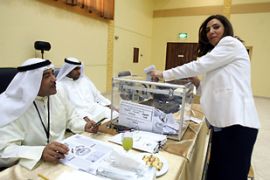Polls close in Kuwait election
Low turnout for vote aimed at ending deadlock between ruling family and parliament.

A total of 210 candidates, including 16 women, stood for a four-year parliamentary term, but analysts see little hope that the political deadlock will end, whatever the outcome.
“The deadlock will continue because the champions who caused the deadlock last time will come back,” Abu Khalid, a voter in his 60s, said.
Etab Khalaf, another voter, said: “People don’t want to vote, everyone is rejecting the deadlock and want change.”
Around 385,000 people were eligible to vote, with female voters making up 54.3 per cent.
Struggling economy
While some analysts have suggested women may have a better chance of winning this time, Islamists and tribal figures who have opposed government economic plans are expected to dominate again, which could continue to delay reforms and stall efforts to salvage Kuwait’s struggling economy.
| In depth | ||
|
|
Campaigning focused on ways to steer Kuwait through the global economic crisis.
Declining oil prices, which account for 90 per cent of the government’s income, have hit the country’s finances badly.
The new assembly will have to vote on a $5 bn economic stimulus package seen as crucial to overcoming the financial crisis.
It was approved in March by the cabinet but abandoned after the emir dissolved the parliament.
Many candidates vowed to oppose it.
The government has also proposed several reforms, of investment laws among other things, and the upgrading of the petrochemical infrastructure.
Bickering stunts reform
Bickering between the cabinet, controlled by the ruling family which is pushing for economic reforms, and politicians elected to the parliament, has brought development to a halt.
“The stock market value just last August was at 64bn Kuwait dinars [about $200bn]. Now the value of the market is half of that,” Adnan Al-Delaimi, a Kuwaiti financial expert, told Al Jazeera.
“Many factors made the economic situation worse – the decline in oil prices, the global financial turmoil – but it is the ongoing political bickering between the ruling family and the country’s parliament that is making things worse.”
Other Gulf states, such as the United Arab Emirates, Qatar and Bahrain, have transformed themselves into commercial, financial and tourist centres by attracting foreign investors.
But Kuwait’s parliament has vetoed many of the projects, accusing the government of incompetence, corruption and mismanagement of public funds.
Local businessmen, frustrated with both the political and economic climate, have demanded an immediate recovery plan.
Al-Delaimi said: “Foreign direct investment inflows have decreased substantially since the crisis began and since this conflict really started.
“The major reason of course is there is political instability, and since foreign investors see instability even in the best of democracies, they will get worried and they will pull out their investments.”

